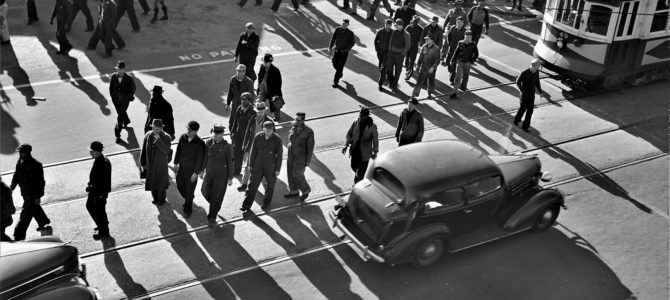
On Labor Day, a local ABC News affiliate in Alabama published the dejected headline “Jobless Americans have few options as benefits expire” with what we could only wish was a tongue-in-cheek photo of a giant, all-caps “NOW HIRING” sign. The post garnered deserved mockery on Twitter, pointing out that businesses desperate to hire workers offer a straightforward option to many jobless Americans.
https://t.co/gmQOH77VzO pic.twitter.com/qlfbBt9zXN
— Tristan Justice (@JusticeTristan) September 7, 2021
Meanwhile, even corporate news outlets admitted that August’s jobs report, published Friday, was measly. Unemployment fell by only 0.2 percentage points, and the U.S. economy added a mere 235,000 jobs over the course of the month: small beans in an economy where you can’t drive down Main Street without seeing marquee boards peppered with “apply now” signs. Since June 2020, the labor force participation rate has sat between 61 and 62 percent, meaning a sizeable number of Americans aren’t even looking for work.
In the face of such a discouraging outlook, days after the country celebrated work by taking another day off, it’s worth giving a moment’s thought to the famed old American work ethic. Is it dead, or — as a Wall Street Journal op-ed asked in the wake of COVID-19 lockdowns and inflationary handouts — “Is the American work ethic dying?” How should we as a country, or at least as caring individuals, cultivate it moving forward?
It’s been in vogue for a while now to critique the idea of an American culture of hard work. An American Dream that can be achieved in the face of circumstantial hardships doesn’t compute with the narrative of systemic economic oppression.
“The idea…has become more mythology than reality in a country with yawning income inequality and stagnating upward economic mobility,” wrote Bryce Covert for Longreads in 2019. The Atlantic blamed rich men for setting a tone of workaholism for the rest of the country, and used the conversation to conclude that America needs government health care.
With the American work ethic under barrage from both sides — philosophical criticism from the media and very practical discouragement from government handouts and bad jobs reports — what are those who want to keep the American Dream alive to do?
The Vocational Value of Work
First, we should recognize that work is a good thing. Man has been designed to work since Eden, and work remains a means of providing for our loved ones, an opportunity to be part of something greater than ourselves, and even an offering we can make in service to our creator.
But work can only be all three of those things if we define it properly. We should be careful not to equivocate paycheck with vocation. Bringing home financial stability is certainly praiseworthy and vital — but a healthy work ethic and the love of money are not the same thing.
Nor is a healthy ethic of hard work the same as being “busy.” As someone who has to constantly use my phone for much of my job, I’ve noticed with reproof that I can hardly sit still at a red light. The self-imposed pressure to make the most of 30 seconds by replying to a text can be productive, but so can using the 30 seconds to observe my surroundings, clear my head, and think. Moreover, work for the sake of money or for the sake of being “busy” will almost always end in counterproductive burnout.
Not everyone will have the job of one’s dreams at any given point in one’s life, but any honest worker can take pride in providing the service he provides well. We should work hard, appreciating the reward of doing something worthwhile. Work ethic is inherently a forward-thinking investment; we invest time and energy into a job when we see it as meaningful, more than just a tradeoff for a direct deposit at the end of the week.
We Define Work Too Narrowly
While time invested is important, we should also stop defining a healthy, robust work ethic by a single factor: the hours Americans spend at the office. Critics and cheerleaders alike love to tout the fact that “we annually put in more hours, on average, than workers of most industrial nations.” But clearly, based on the latest headlines, that alone hasn’t kept a national work ethic alive and thriving.
Staying late at the office, or working extra hours on a side gig, is certainly a helpful indicator of a hardworking lifestyle. There are very good reasons to pull long hours: investing extra thoughtfulness into a project, pulling weight during an especially busy week, genuinely caring about your work, or perhaps simply wanting to be financially responsible or demonstrate diligence.
But quality and quantity remain different things, and we do work — and ourselves — a disservice by defining it far too narrowly. The American life should not be partitioned between work at the office and the obligatory Netflix you watch for the rest of the evening when you get home. There are other ways to live your life than binging TV, and other means of cultivating work than (only) punching a clock.
The stereotype of a hardworking lifestyle might be grabbing fast food so you can keep writing emails and don’t have to stop to make dinner, but such a simplification neglects the fact that thoughtfully preparing a meal is its own kind of fulfilling work. Spending a spare Saturday afternoon tending a garden, baking a cake, crafting a backyard carpentry project, or even going for a run is a means of applying that fruitful, constructive lifestyle, even if it isn’t hours on the clock.
We can and should cultivate work ethic in the ways we serve our families, churches, and communities. A job is an important (and often the most visible) laboratory for hard work, but a diligent, hardworking attitude isn’t something you leave at the office. Of course, we should also appreciate the need for rest — real rest — and its distinction from mindlessly scrolling Facebook.
The best answer to national problems is often a local one. While we can’t singlehandedly reverse a disappointing jobs report, we can cultivate in ourselves an American work ethic that sees work as part of a bigger picture rather than an end in itself, and values work more highly because of it.









